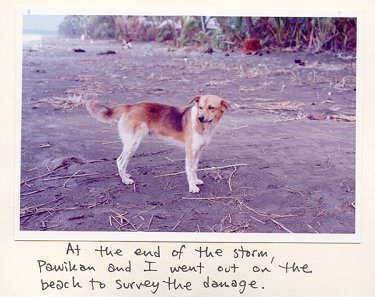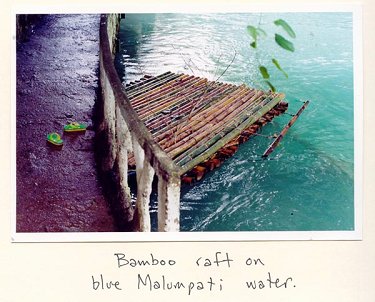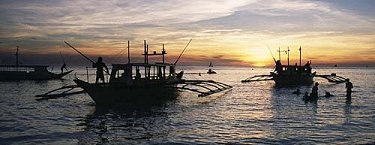|
|
Callan Bentley Philippines |
|
The Typhoon Subsides
The Typhoon Subsides
We joked and laughed and squinted into the wind. Then the rain started pelting again, and we yelped and ran for cover.
Back inside, Noah gleaned some facts from the radio: it’s a Signal One typhoon, the mildest incarnation of the five-part scale. I could imagine a storm being worse than this, I guess, but my imagination stops at Signal Three. What a Signal Five typhoon would be like, I have no earthly clue. It must be horrendous, and must strip the islands clean of anything on them. Despite the low classification, the winds in excess of 150 k.p.h. have earned this storm the classification of “supertyphoon.” Also, there are the first reports of casualties: two men from Pandan died when their fishing boat capsized several miles out. The radio also reminded us that today is July 4th, American Independence Day. No fireworks for us tonight. Cabin fever had set in full by the end of the second day. 48 hours is a long time to spend in a bamboo cabin with your friend, a sleeping dog, a piss-ant cat, and a woman scorned. I tried to relieve my inner tension by doing push-ups in the storage room. It helped for a while. The electricity was still out, and the routine of sitting, reading, writing, talking, eating, and sleeping had begun to chafe. In the late afternoon, the rain eased again, and I elected to take a walk. Noah had taken a break from his efforts at attempting to indirectly convince Zita to leave, and had gone to a meeting; Zita herself was writing in her sullen notebook. I donned my raincoat and whistled up Pawikan the dog. The gate to Noah’s yard had been sealed shut by the accumulation of wave-borne debris outside, so we had to squeeze through to exit. Off on a stroll through the typhoon! The sea had receded a bit, and the beach was again revealed to us to walk on. The sand was dark and firm, the mountains obscured by the gray mist and clouds. As they had been for days, all the coconut palms and nipa fronds along the beach were bent inland, as winds continued to blast in unceasing from the south. But precipitation was light, and Pawikan and I enjoyed the stroll west along the coast of Pandan Bay. There were some terns with forked tails in the air above the waves. How these birds were managing to fly in this wind was beyond my comprehension: I could only just manage to walk! We reached a gravel bar where a river flowed into the bay. Huge clots of vegetation were bobbing down the swollen river, more mast for the re-depositing powers of the sea. I threw a stick for Pawikan, but he showed no interest. We turned around and began to meander back. Almost immediately, a new squall blew in. I was pelted with horizontal rain that stung my skin like gravel pellets. I was exceptionally thankful I had my raincoat with me, and I pulled the hood sideways over the right side of my face. I began running, and Pawikan needed no further cue. The dog ran much faster than I was able to go, and periodically he hid behind palm trunks and clusters of nipa. When I caught up to his position, he would sprint for the next shelter. Shelter doesn’t mean having a roof above your head, at least not here: it means having an object between you and the sea! The equation for the Philippines is: Horizontal rain = horizontal shelter. I got back to the house feeling really good, exhilarated by my small adventure. I took an extended shower and dried off and felt clean and exercised and contented. An evening cadre of guests gathered in Noah’s house: Boy, Zita, neighbor Linda, Bimbot the veterinarian, Noah himself, me, and the wet Pawikan, who was enjoying a scratch from his owner. The grayness outside faded to black, and another day had ended. Still the storm continued; I was exasperated: this was so unlike the summer afternoon thunderstorms that I have been used to in DC and Virginia. At some point, Noah and Zita talked and reconciled their silent conflict. We bought some San Miguel and stayed up a while, listening to the BBC. Zita had cheered up, and again I was shocked to see the 180-degree change in her personality. She was again an extrovert, calling the beer by nicknames like “SMB” and “Vitamin B1.” We had a good time together, the three of us, more relaxed than in days. The storm reflected the change, and though it could only be described as “a dark and stormy night,” the roar has abated from freight train to mere Mack truck.
Heading Out For A Hike
Like a fever, on the third day the typhoon broke. I went out to the beach at dawn, and found myself one among many. Up and down the beach, people were out surveying the damage. One woman was scavenging through the detritus. For my part, bolstered by strong coffee, I surveyed the shore. The ocean certainly looked calmer than it had the previous day. The breakers were still a mass of froth, but less of it than before. The waves still reached high on the beach, but not as high: there were four meters of “breathing room” between the edge of the ocean and Noah’s house.
For breakfast, we walked into town. One of the vendors at the market sells bananas fried in coconut oil. They are warm and sweet, crispy and pasty. The bananas are served on a sliver of bamboo, like a Popsicle stick. They had become my new favorite snack. We also bought some rolls and pastries from the bakery. As we wander around eating, we see the first scraps of blue sky above. Good news; I loosen the collar of my jacket. On the way back to the house, we walked along the beach, dodging waves. A lesser frigatebird hung in the air above the trees. Noah had arranged with Boy to have Zita go stay with them. Boy arrived, glad to have a guest for his wife to talk to. He pulled Zita on his motorcycle, and they headed off to Libertad. We were thankful to have her gone. Instead of luxuriating in the extra space in the nipa hut, we opt to go for a hike, the sporadic tinkle of rain seems like Paradise to our typhoon-weary souls. We grab some snacks, some canned tuna and crackers, fill our water bottles, whistle to the dog. Out on the main road, we flag down a trike that is headed south. Noah climbs into the front part and pulls Pawikan into his lap. I tuck myself into the tiny back space, and watch the muddy road slide by and we chortle past rice paddies and copses of palm and banana trees. I am feeling a cold coming on, and my stuffed sinuses distort my sense of balance. I slam my head repeatedly on the roof of the metal sidecar, as the road offers unpredictable potholes and washed gullies. We have the trike driver drop us off near the home of Nursing, a burly Filipino hunter who collects information on the forests for Noah’s organization. Nursing is at home, sitting with his relatives and neighbors under a corrugated tin roof. We duck under to join them. Several of the old men and women are drinking tuba, the Filipino moonshine of fermented coconut juice. We try a little, but I choose only a token sip, since I am already mildly ill. I can see specks of dirt floating in the grayish liquid. Noah gives Nursing a copy of National Geographic: earlier in the month, the two of them had helped to guide a Geographic photographer on an expedition to photograph hornbills in the forest. They converse in Kinaraya as Nursing examines the colorful magazine. All around us is dirt, and children and chickens and dogs are covered in mud. They all stare at Noah and I. I feel conspicuous. Even the damned chickens are staring! After three days indoors, sequestered with a small crowd in the tiny nipa hut, this public scrutiny seems extreme. I smile and nod, and fake another sip of the noxious tuba. We bid farewell, and set off. Our next stop is similar: another hunter and his family. To get to their house, we must walk a balance-beam of mud between two adjacent rice paddies. If I slip and lose my balance, I will be submerged in two feet of liquid mud and baby rice plants. Frogs squeal as they launch themselves from our path, little amphibious trajectories in damp air. We fold ourselves through the door of the second hut, and I am introduced to another family, children, dogs, and curious elderly neighbors again in conspicuous attendance. One little boy stands with snot running down his chin. He wears only a stained tee-shirt. Noah makes a gift to the hunter of a Lonely Planet Tagalog-English phrasebook. Who knows if this will ever be of use to them: I guess that’s not the point.
Hiking, Serendipity, Beer Truck Lift back to Town
After our respects have been paid, we set off into the woods. A squall of rain moves in, and we run for cover. Noah pushed open a door to a house and yelled to me, “I know these people!” I follow. There were a woman and a girl in there, and they looked shocked. I hoped that Noah knew what he was doing. Noah explained to them that he knows Junior, husband to the woman, father to the little girl. They agreed to let us wait out the rain in their living room. Again, the floor was merely dirt, and a pig snorted from the next room. Noah found a pencil to offer as a gift to the daughter, exhorting her to use it in school. Time passed, the rain continued. I began to feel more and more like I was intruding. I suggested that we leave, and Noah agreed.
The rain was less now, but the mud was thick along the path that we follow up into the forest and hills. My shoes were sodden: essentially hiking in a stream of brown goo. Carabou shit mixed with the native soil, a volcanic clay mud. It all sloshed in my beat-up old sneakers. We were rewarded with a fine view the higher we hiked: Pandan Bay stretched in vast crescent from our vantage north. Ahead of us, were hills and trees, and the potential of mysterious birds. We encountered a man hauling some wood down from above: a poacher or a subsistence gatherer or just a regular guy getting some firewood, depending on your definition. The rainforest up into the mountains was thick and mysterious. Undrained of its fantastic biological potential, this forest emitted odd shrieks and hums. We crossed several crude fences. At one, we stopped and had our snack, and decided to head back downhill. The weather cleared, and we hiked back down via a different route. We found a tree weighed down with the nests of several ant hives. These were the vicious ants that will swarm upon anything that disturbs their nests. I was glad that we spotted them before upsetting their branches. The nests are each the size of a loaf of bread, stitched together of green leaves with a white fibrous-looking glue. Once safely past, I felt the inclinations of the meddling teenager in me rise, mischievous towards the stinging insects. I pick up a stick. “Hey, Noah, watch this.” I poked the nests to rile up their denizens. They POURED out in an incredibly rapid stream. We backed away and chuckled. But first and foremost, we backed away: these ants emit an alarm pheromone that recruits others to the fray. Further down, we found ourselves picking our way through a terraced rice paddy. There, an old man hailed us, and began talking to Noah in formal, well-enunciated Old Visayan language. Noah was barely able to understand the archaic accent, but politely listened, and offered me rough translations. Like a modern Yankee talking to an Irish septuagenarian, he could only manage a general gist of the monologue. The old man had bright blue eyes, very intense as he gesticulated and apparently told us about the Bible. He led us the rest of the way down to the road, presenting us to a motley clan of family and hangers-on gathered by the roadside. They were at first shocked at the appearance of these two strange white men from out of the forest, but they relaxed significantly and even laughed when Noah began charming them with his well-practiced Kinaraya. The old man now looked sheepish, and he backed away to the rear of the crowd. The women in the crowd expressed a fear of snakes, telling us that they would never venture into the forests. Noah responded with an ecological tact, explaining to deaf ears how even snakes have an important place in the forest ecosystem. Somebody produced a bottle of Tanduay, the Filipino rum, admonishing us to drink. We declined, and took that as our cue to cut short the conversation and get moving. Getting back to Pandan turned from a sketchy proposition into a glorious moment, when we hailed a beer delivery truck for a ride. We presented a great tableau: Two white guys and a muddy dog balanced atop seventy crates of San Miguel bottles, lurching on a flatbed truck on a muddy road, surrounded by the glory of the rice paddies and banana trees and the rainforest and the ocean, and indeed the whole fine world. I felt so good just then; it was my crowning moment for the afternoon, the whole muddy hike worth it just to be in this bizarre movement en route back to Pandan and hot food. I felt like we were in the Macy’s Day Parade; certainly enough heads turned to watch our progress as we rattled by. Back in Pandan village, we met up with Boy and had a bowl of noodles at a restaurant with him. The salty soup was excellent, and at Boy’s suggestion, I ordered mine “special.” This turned out to mean that it came with an egg dropped into the middle of the bowl. For dessert, I insisted on another banana fried in coconut oil from the market vendors.
Borocay
We finally did make it to the adjacent island of Borocay soon thereafter. Because Borocay differs so much from its larger neighbor, it’s worth relating a few details of that daytrip here. Struck with the realization that we had little else to do one afternoon, we hopped in the “Owner-type” and drove 45 minutes to Caticlan. In Caticlan, we parked the jeep. Noah paid someone to watch it. Then we climbed aboard a water-taxi, which was a long boat with outriggers of bamboo. The topography was different here, with chunky limestone coming right down to the beach, in some places hollowed into caves by the tides. Noah told me that Borocay itself was riddled with caverns, home to one of the largest populations of fruit bats in the world. The boat took us quickly across the water, and at a little cove we waded ashore.
Tourism has ruined this island, or has done 90% of that job. It was hideous facsimile of Asian beachness, tacky and commercial in a Vegas-like strip along the beach, but hiding a desperate squalor a few meters away. Behind the curtain of shops, bars, and restaurants, there was a sub-caste of workers living in foul mud. Noah told me of how a golf course was going to be built here, and how an incredible amount of people were brought in to do the work. The golf course deal fell through, and these thousands of people were left there, with no income and nothing to eat. The island’s famous bat population, resident in the caves, became the mainstay of the local diet. The number of bats plummeted for years, and only after it was thoroughly decimated, did the island achieve its current status as a fashionable get-away. Sadly, the garish tourism may be the bats’ best hope for survival: so long as the resort prospers, the island’s workers may have enough money to buy other foods. We found an Internet café, and connected briefly with the outer world. I was feeling slow, and so was my connection. We didn’t have time to dawdle, though, because we had to be sure to catch the last boat back to Panay before nightfall. We grabbed some coffee and some whole wheat bread (unavailable on Panay) and hightailed it back to the cove. The sun fell as we were riding back across the water. Noah made friends again, with perfect strangers, by virtue of his ability to speak the language. I heard him explaining who he was and where he lived and why he was working there. The other passengers on board were all very curious. We gave a ride to two of the passengers on our way back, one of whom, a woman peanut-seller. She gave us each a bag of sugar-coated peanuts as thanks for the lift. That night Noah and I cooked a fantastic meal. The main course was tuna marinated in pineapple juice, garlic, and soy sauce. We also had a big pot of mussels, and that diminished loaf of whole-wheat bread. A swim in the ocean after dinner had to be curtailed when we drifted into a school of “sea ants” which began biting us. I have no idea what a “sea ant” is: it was dark, and I have never heard of such a creature before. It hurt, that’s all I know. I left the ocean after the second one nipped me.
| ||||||||||||||||||||



